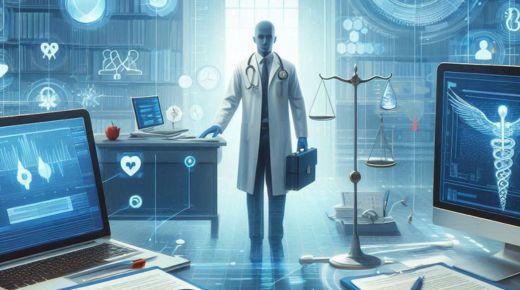Health
The Role of Medical Coders in Healthcare Compliance

One important component for a hassle-free run in the medical process that is followed in this sector is medical coding.The medical coders in healthcare compliance serve as the liaison between medical services providers, insurance companies and patients. Interpreting patient records, loads of procedures and diagnoses into codes, they see to it that the healthcare facilities do not break any rules.
What is Medical Coding?
In simple words we can say that it’s a description of diagnoses and procedures and converting them into codes. These codes are based on universal coding systems including the International Classification of Diseases (ICD), Current Procedural Terminology (CPT), and Healthcare Common Procedure Coding System. The nature of coding dictates that even a tiny mistake can cause an error to be billed out incorrectly, end up as insurance claim denials and in worst-case scenario, legal actions.
Coverage and Billing Accuracy
Medical coders serve as a critical part of the team that ensures healthcare providers are reimbursed for their services. Every service that is provided to the patient right from a regular checkup to any complicated surgery needs documentation and coding accurately in every possible way. Because even a single mistake in the coding can result in inappropriate billing, which means trouble getting paid on time or outright not being reimbursed. Medical coders ensure accuracy in coding and help hospitals to be reimbursed accordingly & on time, which means seamless financial operations.
Preventing Fraud and Abuse
One of the healthcare industry’s biggest hurdles is preventing fraudulent billing practices. This might mean something like overbilling, billing for services not actually provided or upcoding. Medical coders manage this risk by adhering to very rigid coding standards and guidelines. Because coding regulations are everything to a coder, this ensures that only the legitimate claims (and combinations of conditions) get coded – all preventing potential healthcare fraud and abuse.
Staying Current with the Industry
New treatments, technologies and regulations arise constantly in the healthcare industry. Thus, there are constant changes in the rules and regulations. Medical coders need to be updated with these code changes. Otherwise, they will use old codes that lead to rejection which is an expense to healthcare system. For example, changes in the ICD codes or updates to CMS policies can drastically change how medical procedures are coded and billed. Medical coders must continually learn and adapt to be able to do their jobs correctly and ensure that healthcare facilities stay compliant with the ever-changing coding regulations.
Wrapping Up
Technology has come a long way, and this means that the field of medical coding is richer for it. Nowadays, automated coding systems and artificial intelligence tools are introduced to help medical coders spot the right codes quickly. But humans are still needed to verify whether automated systems are accurate and process cases that require human understanding. Skilled coders using the technology push compliance, accuracy, and efficiency in coding.
Health
Your Guide to Finding the Best Urologist in India: Expertise You Can Trust
When it comes to your health, especially something as sensitive and crucial as your urinary or reproductive systems, choosing the right urologist can make a world of difference. In a vast and medically advanced country like India, finding the best care often feels overwhelming. But understanding the role of a urologist, the quality benchmarks, and where to look can help you make an informed decision with confidence.
Understanding What a Urologist Does
A Urologist In India is a medical specialist trained to diagnose and treat conditions related to the urinary tract (kidneys, ureters, bladder, urethra) and male reproductive organs (prostate, testes, penis, etc.). Common issues they treat include urinary infections, kidney stones, prostate enlargement, male infertility, erectile dysfunction, and even cancers of the kidney, bladder, and prostate.
Urology is a complex branch that combines surgical and non-surgical treatment options. Some subspecialties include pediatric urology, uro-oncology, and andrology. A well-qualified urologist not only treats conditions but also educates patients on preventive measures and long-term management.
Why India is a Preferred Destination for Urological Care
India has emerged as a medical tourism hub, not just for affordability but also for the quality of healthcare services. Many Indian urologists are internationally trained and bring vast clinical experience, making them highly sought after.
Advanced urological procedures such as robotic-assisted surgery, laser treatments for kidney stones, minimally invasive prostate surgery, and kidney transplants are now routinely performed across major Indian hospitals. Moreover, the waiting time for treatment is considerably shorter compared to western countries.
Key Qualities of the Best Urologist in India
When evaluating urologists, consider the following aspects:
- Qualifications and Training: Look for doctors who have completed MCh (Urology) after their MS (General Surgery), preferably with international exposure.
- Experience: More years in practice typically indicate better diagnostic and surgical expertise.
- Specialization: Some urologists focus on specific areas like prostate care, stone management, or male infertility. Choose one whose specialty aligns with your needs.
- Technology Adoption: The best urologists stay updated with modern technologies like laparoscopy, endoscopy, and robotics.
- Hospital Affiliation: Doctors practicing at reputed hospitals like Apollo, Fortis, Max, or Medanta often have access to better infrastructure and support.
Top Cities for Urology in India
If you’re seeking urological care, cities like Delhi, Mumbai, Bangalore, Chennai, and Hyderabad host several top-tier specialists. These cities are also well-connected, making them ideal for out-of-town or international patients.
Patient-Centric Care is Key
The hallmark of a good urologist isn’t just expertise but also empathy. Urological issues can be physically and emotionally taxing. The best doctors take the time to listen, explain conditions in layman terms, and offer clarity on procedures, risks, and recovery timelines.
Transparent pricing, post-operative support, and ease of communication are other crucial elements of patient satisfaction.
How to Book an Appointment
Today, it’s easier than ever to consult a urologist online or book an appointment through hospital websites, health aggregator platforms, or mobile apps like Practo, Credihealth, or Lybrate. Many offer video consultations—ideal for follow-ups or second opinions.
Final Thoughts
Finding the Best Urologist In India may take some research, but the country’s medical excellence, affordability, and patient-first approach make it a worthwhile journey. Whether you’re facing a troubling symptom or planning a complex procedure, India’s urological landscape offers high standards of care that rival global benchmarks.
Take charge of your health by consulting a specialist today—because early diagnosis and expert guidance are the first steps toward recovery.
Health
Can Stress Trigger Autoimmune Diseases?

Stress has become an almost constant companion. From work pressures and personal challenges to environmental factors, our bodies are constantly adapting to stressors. While occasional stress is a natural part of life, chronic stress can have profound effects on overall health.
One area that has gained attention in medical research is the potential link between stress and autoimmune diseases. Can stress truly trigger these conditions, or does it merely worsen existing problems? Let’s explore.
What Are Autoimmune Diseases?
Autoimmune diseases occur when the immune system, which typically protects the body from infections, mistakenly attacks its own cells and tissues. Normally, the immune system identifies harmful invaders like bacteria and viruses and responds by neutralizing them.
In autoimmune conditions, however, this defense mechanism fails, leading to inflammation, tissue damage, and a wide range of symptoms depending on the organ or tissue involved. Common autoimmune diseases include:
1. Rheumatoid Arthritis: This occurs when the immune system attacks the joints.
2. Lupus (Systemic Lupus Erythematosus): This affects the skin, joints, kidneys, and other organs.
3. Type 1 Diabetes: This is where insulin producing cells in the pancreas are destroyed.
4. Multiple Sclerosis: This involves attacks on the nervous system.
5. Hashimoto’s Thyroiditis: This targets the thyroid gland.
The autoimmune disorder symptoms can vary widely, from fatigue, joint pain, and skin rashes to organ specific problems, making early diagnosis a challenge.
What Are The Major Causes Of Autoimmune Diseases?
The exact cause of autoimmune diseases is not fully understood, but experts believe that a combination of genetic, environmental, and lifestyle factors contributes to their development. Some of the major causes include:
1) Genetic Predisposition: Certain genes can make individuals more susceptible to autoimmune diseases. Family history often plays a role, although it does not guarantee disease development.
2) Environmental Triggers: Infections, exposure to chemicals, certain medications, or dietary factors may trigger an immune response that leads to autoimmunity.
3) Hormonal Influences: Women are disproportionately affected by autoimmune diseases, suggesting that hormones like estrogen may influence immune system behavior.
4) Immune System Dysregulation: An imbalance in immune system signaling can lead to self reactivity. Factors like chronic inflammation and poor regulation of immune cells contribute to this process.
While these are well recognized contributors, lifestyle and psychological factors, particularly stress, are gaining attention for their potential role in triggering or exacerbating autoimmune conditions.
Is Chronic Stress A Trigger For Autoimmune Diseases?
Prolonged stress has a significant impact on the immune system of the body. The stress response activates the Hypothalamic Pituitary Adrenal (HPA) axis, leading to the release of cortisol and other stress hormones.
Short term stress can enhance immunity temporarily. But chronic stress has the opposite effect. It can promote inflammation, suppress immune function, and disrupt the balance of immune cell activity. Several studies suggest a link between chronic stress and autoimmune diseases:
1. Exacerbation Of Existing Conditions
People with conditions like rheumatoid arthritis or lupus often report flare ups during periods of high stress. Stress can worsen inflammation, intensifying symptoms.
2. Potential Trigger In Susceptible Individuals
For individuals genetically predisposed to autoimmune disorders, chronic stress may act as a trigger, causing the immune system to self attack.
3. Psychological Factors
Psychological factors, including stress and trauma, can influence immune system regulation and potentially contribute to the outbreak of autoimmune disorders.
While stress alone may not directly cause autoimmune diseases, it is increasingly recognized as a significant factor in both triggering and worsening these conditions. Therefore, managing stress is not just beneficial for mental health but may also help in reducing the risk or severity of autoimmune issues.
How Can Autoimmune Diseases Be Treated?
Treatment for autoimmune diseases varies depending on the specific condition, its severity, and the organs affected. The primary goals are to reduce immune system overactivity, manage symptoms, and prevent organ damage. Common approaches include:
1. Regular Monitoring And Supportive Care: Autoimmune diseases often require ongoing monitoring by healthcare professionals to adjust treatments. To prevent complications, it is important to get autoimmune disease treatment in Coimbatore and enhance your quality of life.
2. Lifestyle Modifications: Diet, exercise, and stress management play crucial roles in managing autoimmune conditions. Anti inflammatory diets, regular physical activity, and adequate sleep can improve overall health and potentially reduce flare ups.
3. Stress Management Techniques: Mindfulness meditation, yoga, deep breathing exercises, and Cognitive Behavioral Therapy (CBT) are effective in lowering stress, which may indirectly reduce autoimmune activity.
4. Medications: Medicines reduce inflammation and pain, help calm an overactive immune system. These target the immune response to minimize tissue damage.
Conclusions
Autoimmune diseases are complex conditions influenced by a mix of genetics, environmental factors, and lifestyle choices. Therefore, chronic stress trigger autoimmune flares and also exacerbates immune system dysregulation and triggers autoimmune responses in vulnerable individuals.
Recognizing the impact of stress and taking proactive steps to manage it, through mindfulness, therapy, or lifestyle adjustments, can be an essential part of preventing or managing these conditions.
Ultimately, understanding the relation between stress and autoimmunity helps individuals to take control of their health, combining medical treatment with holistic approaches for better outcomes. To reduce autoimmune flare ups, visiting the best rheumatology hospital in Coimbatore can help improve your overall wellbeing and support long term immune health.
Health
Medical Oncology Hospital in India & Expert Medical Oncologists
India has emerged as a global hub for high-quality and affordable cancer treatment, with medical oncology at the forefront. Medical oncology is a vital branch of cancer care, focusing on the diagnosis, treatment, and management of cancer using chemotherapy, immunotherapy, targeted therapy, and hormone therapy. With advancements in technology, the availability of skilled professionals, and world-class infrastructure, the Medical Oncology Hospital in India sector has gained immense recognition from patients across the globe.
Understanding Medical Oncology
Medical oncology is one of the three primary disciplines in cancer treatment, alongside surgical oncology and radiation oncology. A medical oncologist is the physician who coordinates a patient’s cancer care, recommending systemic treatments based on the type, stage, and molecular profile of the tumor.
These specialists work closely with pathologists, radiologists, surgeons, and radiation oncologists to formulate personalized treatment plans. From administering chemotherapy to managing side effects and conducting follow-ups, they play a pivotal role in the patient’s journey.
Top Medical Oncology Hospitals in India
India is home to some of the best medical oncology hospitals that provide comprehensive cancer care. These institutions are equipped with state-of-the-art technologies such as PET-CT, linear accelerators, bone marrow transplant units, and robotic surgical systems. Some of the leading hospitals include:
- Tata Memorial Hospital, Mumbai – A pioneer in cancer research and treatment, offering affordable care and advanced therapies.
- AIIMS, New Delhi – Known for its expert faculty and cutting-edge cancer treatments.
- Apollo Cancer Centre, Chennai & Hyderabad – Offers a multi-disciplinary approach with a dedicated medical oncology department.
- Max Super Specialty Hospitals – Provides precision oncology and access to global clinical trials.
- Fortis Memorial Research Institute, Gurgaon – Equipped with next-gen diagnostic and treatment facilities.
These centers not only attract patients from within the country but also from abroad, owing to their reputation for excellence, affordability, and compassionate care.
Role of a Medical Oncologist in India
A Medical Oncologist in India is trained to understand the biology of cancer and the latest advancements in oncology research. Their primary responsibilities include:
- Diagnosing cancer through biopsies, scans, and blood tests.
- Staging the disease and determining the extent of spread.
- Designing an individualized treatment plan that may include chemotherapy, immunotherapy, or targeted therapy.
- Managing side effects and improving quality of life.
- Monitoring patients during remission and ensuring timely follow-ups.
Indian medical oncologists are often trained in premier institutions and many hold international fellowships, making them globally competitive. Many hospitals also have tumor boards where a group of experts jointly decide on the best course of action for each patient.
Why Choose India for Medical Oncology Treatment?
India offers several advantages for patients seeking cancer treatment:
- Cost-effective care: Cancer treatment in India is significantly more affordable compared to Western countries, without compromising quality.
- Internationally trained specialists: Oncologists in India are highly experienced and many have trained at top global institutions.
- Advanced infrastructure: Indian hospitals are equipped with modern technology for diagnosis, treatment, and research.
- English-speaking medical staff: Ensures seamless communication for international patients.
- Shorter waiting times: Quick access to treatment can be crucial in managing cancer effectively.
Innovation and Research
India is also making strides in clinical research and trials in medical oncology. Hospitals collaborate with global pharmaceutical companies and research institutes to test new drugs, targeted therapies, and precision medicine approaches. This gives patients access to innovative treatments that may not be available elsewhere.
Conclusion
The field of medical oncology in India is witnessing rapid growth, driven by technological innovation, expert physicians, and world-class hospital infrastructure. Whether you’re looking for preventive oncology, early-stage diagnosis, or complex cancer management, India offers reliable and compassionate care tailored to each patient’s unique needs. Choosing a reputed Medical Oncology Hospital in India and consulting a skilled Medical Oncologist in India can make a significant difference in the outcome and quality of life of a cancer patient.
